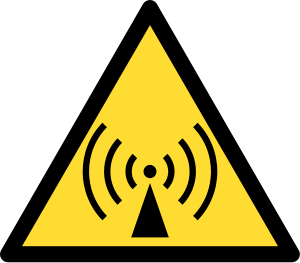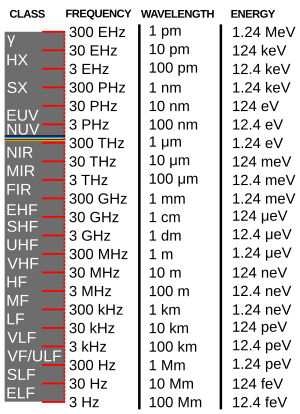Non-ionizing radiation facts for kids
Non-ionizing radiation is a type of electromagnetic radiation that doesn't have enough energy to completely remove an electron from an atom or molecule. Think of it like a gentle nudge instead of a strong push. This means it can't cause the kind of damage to DNA that ionizing radiation can.
The Sun sends us a lot of non-ionizing radiation every day. Our atmosphere helps to block most of the stronger, ionizing radiation before it reaches us.
Contents
What is Non-Ionizing Radiation?
Non-ionizing radiation is part of the electromagnetic spectrum. This spectrum includes all kinds of waves, from very long radio waves to very short gamma rays. Non-ionizing radiation is found on the longer, lower-energy end of this spectrum.
It's different from ionizing radiation because it doesn't have enough power to "ionize" things. Ionizing means taking an electron away from an atom. When an electron is removed, it can change the atom and sometimes damage living cells. Non-ionizing radiation usually just makes atoms vibrate or heat up.
Types of Non-Ionizing Radiation
Many types of radiation we use every day are non-ionizing. They are all around us!
Radio Waves
Radio waves are the longest waves in the electromagnetic spectrum. They have the lowest energy. We use them for many things, like:
- Sending signals for radio and television
- Mobile phone communication
- Wi-Fi signals
- Radar systems
Radio waves travel long distances and can go through buildings. This makes them great for communication.
Microwaves
Microwaves are shorter than radio waves but still have low energy. You probably know them best from microwave ovens.
- Microwave ovens use these waves to make water molecules in food vibrate, which heats the food up.
- They are also used in radar and for some types of communication, like satellite signals.
Infrared Light
Infrared (IR) light is what we feel as heat. Everything that has heat gives off infrared light.
- Remote controls for TVs use infrared light to send signals.
- Night vision cameras use infrared to see in the dark.
- Doctors use infrared thermometers to check body temperature.
- Heat lamps and toasters also use infrared light.
Visible Light
Visible light is the only part of the electromagnetic spectrum that our eyes can see. It's what makes up all the colors of the rainbow.
- The Sun gives off a lot of visible light.
- Light bulbs, computer screens, and flashlights all produce visible light.
- It helps us see the world around us.
Ultraviolet (UV) Light
Ultraviolet (UV) light is just beyond visible light on the spectrum. Some UV light is non-ionizing, but some can be ionizing.
- The UV light from the Sun can cause sunburns.
- It helps our bodies make Vitamin D.
- UV lamps are used to kill germs and sterilize equipment.
- Some insects can see UV light, even though humans can't.
How Does It Affect Us?
Non-ionizing radiation generally interacts with our bodies by causing molecules to vibrate, which can create heat. This is why a microwave oven heats food. For most everyday exposures, like from Wi-Fi or radio, the energy is very low and doesn't cause any noticeable heating or harm.
However, strong sources of non-ionizing radiation, like very powerful lasers or strong microwave beams, can cause burns if you are too close. That's why it's important to be careful around such equipment. Unlike ionizing radiation, non-ionizing radiation does not have enough energy to directly damage DNA or cause cancer in the same way.
Related Pages
See also
 In Spanish: Radiación no ionizante para niños
In Spanish: Radiación no ionizante para niños
 | Victor J. Glover |
 | Yvonne Cagle |
 | Jeanette Epps |
 | Bernard A. Harris Jr. |




